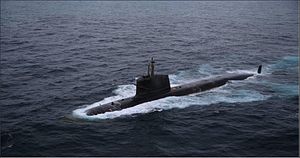The Indian Navy’s (IN) latest two Scorpene-class (Kalvari-class) diesel-electric attack submarines (SSK) are currently undergoing sea trials while the remaining three subs of the class are under construction, a senior naval official said this month.
“The second and third of the six Scorpene-class submarines are undergoing sea trials while the fourth, fifth and the sixth are under construction. We want to focus on first getting all these submarines commissioned, before going in for more submarines,” Vice Admiral Srikant, the commandant of the National Defense College said on March 16, according to local media. The SSKs will be armed with heavy weight torpedoes and anti-ship missiles. The SSKs are also expected to be retrofitted with a domestically designed and manufactured air-independent propulsion (AIP) system.
Indian Prime Minister Narendra Modi commissioned the first-of-class INS Kalvari in December 2017. The INS Khanderi, the second Kalvari-class SSK, was launched in January 2017 commenced sea trials in July of that year. While the IN originally planned to commission the Khanderi by the end of 2017, various delays caused the induction ceremony to be pushed back to 2018. The future INS Karanj was launched at the end of January at a naval dockyard in Mumbai and is now expected to join the service in late 2018 or 2019. The remaining three SSKs are expected to be delivered by the end of 2020.
“The Indian government awarded French shipbuilder Naval Group (formerly known as Direction des Constructions Navales Services ) a $4.16 billion contract for the construction of six diesel-electric attack submarines for the Indian Navy in partnership with Mumbai-based Mazagon Dock Limited under the so-called Project-75 acquisition program,” I explained last year. The IN has decided to scrap plans to place a follow-up order for six additional Kalvari-class boats with DCNS, as I reported previously (See: “India Drops Plans to Add 3 More French Stealth Attack Submarines”):
With DCNS apparently out of the competition for the next phase of Project 75-I, India will have to look among the French ship maker’s competitors – including Navantia (Spain), Kockums (Sweden), Rubin Design Bureau-Amur Shipyard (Russia), Mitsubishi Heavy Industries, and Kawasaki Heavy Industries (Japan) – to choose a foreign defense contractor to build an additional six diesel-electric attack submarines in Mumbai.
The Indian government has recently reissued an acceptance of necessity, the first formal step in procuring a new weapon system, for the estimated $6 billion Project 75-I. An annually held joint India-French naval exercise saw the first participation of a Kalvari-class boat in a bilateral naval drill earlier this month.

































